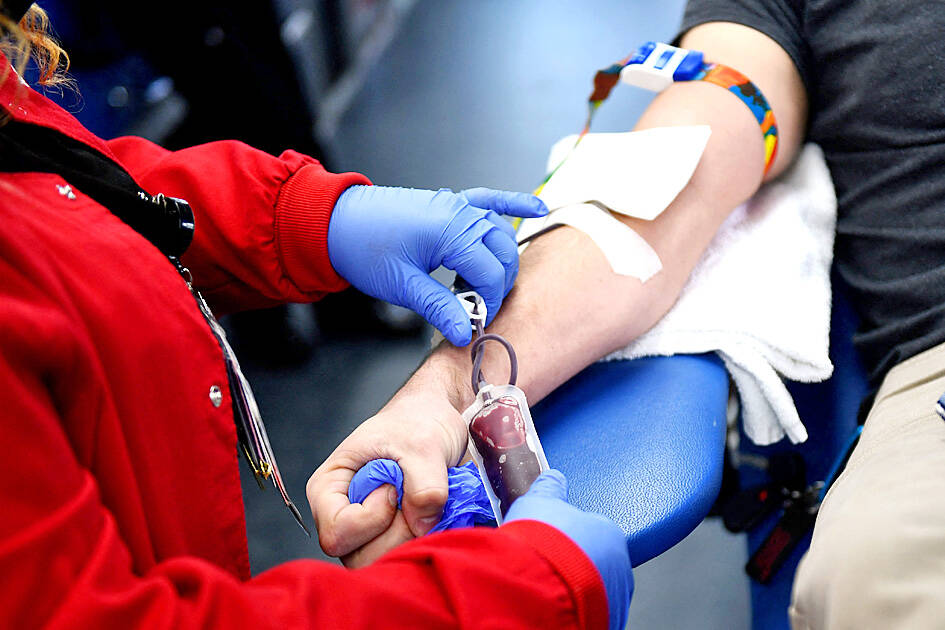The US is moving to further ease restrictions on blood donations from gay and bisexual men and other groups that typically face higher risks of HIV.
The US Food and Drug Administration (FDA) on Friday announced draft guidelines that would do away with a three-month abstinence requirement for donations from men who have sex with men.
Instead, all potential donors would be screened with a new questionnaire that evaluates their individual risks for HIV based on sexual behavior, recent partners and other factors.

Photo: AFP
If finalized, many gay and bisexual men in monogamous relationships would be able to donate blood for the first time in decades.
It is the latest move by the FDA to broaden donor eligibility, with the potential to boost donations.
“We feel confident that the safety of the blood supply will be maintained,” FDA Center for Biologics Evaluation and Research Director Peter Marks told reporters.
Gay rights groups have long opposed blanket restrictions on who can give blood, saying they discriminate against the LGBTQ community.
Medical societies including the American Medical Association have also said such exclusions are unnecessary given advances in technology to test blood for infectious diseases.
“Current and former blood donation policies made unfounded assumptions about gay and bisexual men and really entangled individuals’ identity with their likelihood of having HIV,” Human Rights Campaign legal director Sarah Warbelow said.
The US and many other countries started blocking blood donations from gay and bisexual men during the early 1980’s AIDS epidemic, aiming to prevent the spread of HIV through the blood supply.
In 2015, the FDA dropped the lifetime ban and replaced it with a one-year abstinence requirement. In 2020, the agency shortened the abstinence period to three months, after donations plummeted during the COVID-19 pandemic.
Regulators said there has been no negative effect on the blood supply as a result of the changes.
The FDA sets requirements and procedures for blood banks throughout the US.
All potential donors answer questions about their sexual history, injectable drug use and any recent tattoos or piercing, among other factors that can contribute to the spread of blood-borne infections.
Donated blood is then tested for HIV, hepatitis C, syphilis and other infectious diseases.
Under the new proposal, men who have sex with men are to be asked if they have had new or multiple partners in the past three months. Those who answer affirmatively to either question and also report having anal sex would be barred from donating until a later date.
The policy would also apply to women who have sex with gay or bisexual men.
The proposed policy mirrors those used in Canada and the UK.

The Burmese junta has said that detained former leader Aung San Suu Kyi is “in good health,” a day after her son said he has received little information about the 80-year-old’s condition and fears she could die without him knowing. In an interview in Tokyo earlier this week, Kim Aris said he had not heard from his mother in years and believes she is being held incommunicado in the capital, Naypyidaw. Aung San Suu Kyi, a Nobel Peace Prize laureate, was detained after a 2021 military coup that ousted her elected civilian government and sparked a civil war. She is serving a

China yesterday held a low-key memorial ceremony for the 1937 Nanjing Massacre, with Chinese President Xi Jinping (習近平) not attending, despite a diplomatic crisis between Beijing and Tokyo over Taiwan. Beijing has raged at Tokyo since Japanese Prime Minister Sanae Takaichi last month said that a hypothetical Chinese attack on Taiwan could trigger a military response from Japan. China and Japan have long sparred over their painful history. China consistently reminds its people of the 1937 Nanjing Massacre, in which it says Japanese troops killed 300,000 people in what was then its capital. A post-World War II Allied tribunal put the death toll

‘NO AMNESTY’: Tens of thousands of people joined the rally against a bill that would slash the former president’s prison term; President Lula has said he would veto the bill Tens of thousands of Brazilians on Sunday demonstrated against a bill that advanced in Congress this week that would reduce the time former president Jair Bolsonaro spends behind bars following his sentence of more than 27 years for attempting a coup. Protests took place in the capital, Brasilia, and in other major cities across the nation, including Sao Paulo, Florianopolis, Salvador and Recife. On Copacabana’s boardwalk in Rio de Janeiro, crowds composed of left-wing voters chanted “No amnesty” and “Out with Hugo Motta,” a reference to the speaker of the lower house, which approved the bill on Wednesday last week. It is

FALLEN: The nine soldiers who were killed while carrying out combat and engineering tasks in Russia were given the title of Hero of the Democratic People’s Republic of Korea North Korean leader Kim Jong-un attended a welcoming ceremony for an army engineering unit that had returned home after carrying out duties in Russia, North Korean state media KCNA reported on Saturday. In a speech carried by KCNA, Kim praised officers and soldiers of the 528th Regiment of Engineers of the Korean People’s Army (KPA) for “heroic” conduct and “mass heroism” in fulfilling orders issued by the ruling Workers’ Party of Korea during a 120-day overseas deployment. Video footage released by North Korea showed uniformed soldiers disembarking from an aircraft, Kim hugging a soldier seated in a wheelchair, and soldiers and officials